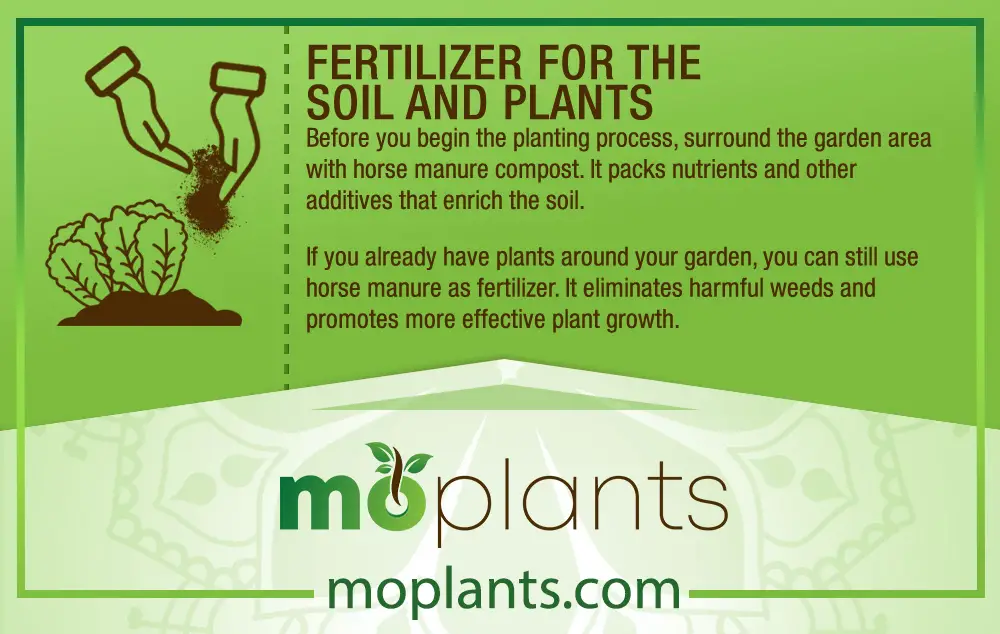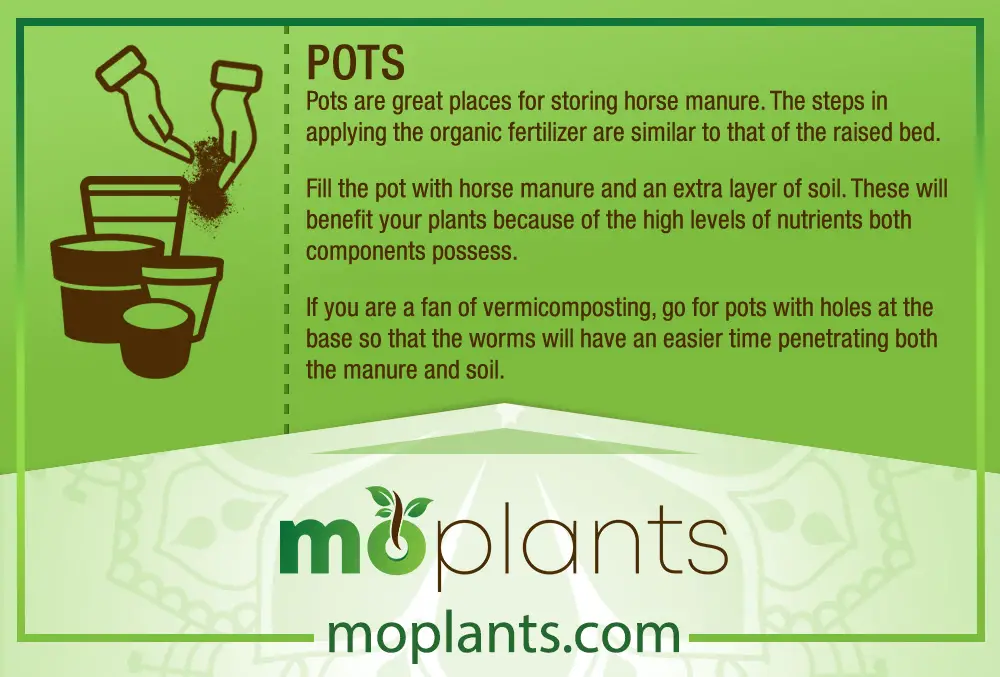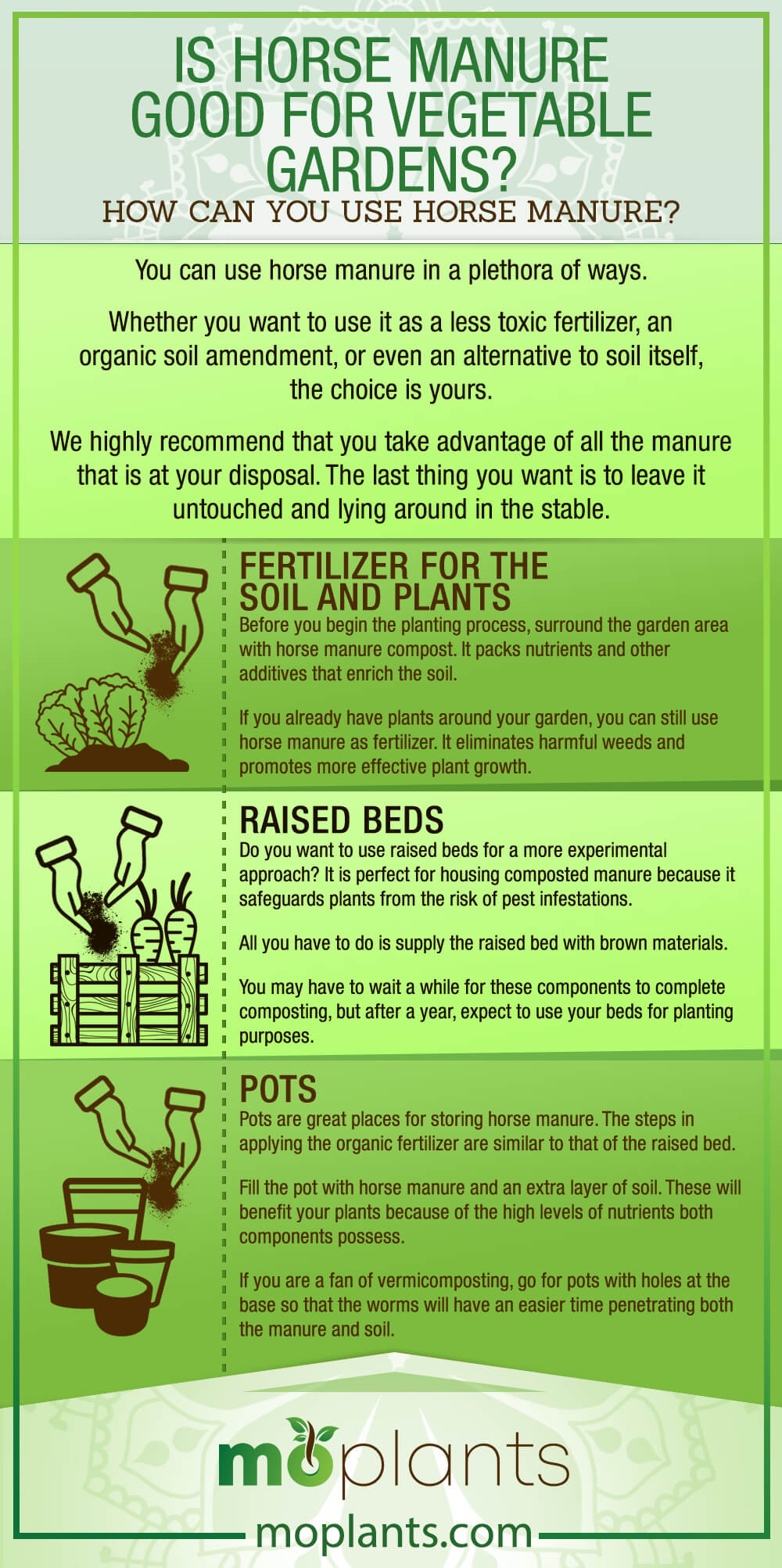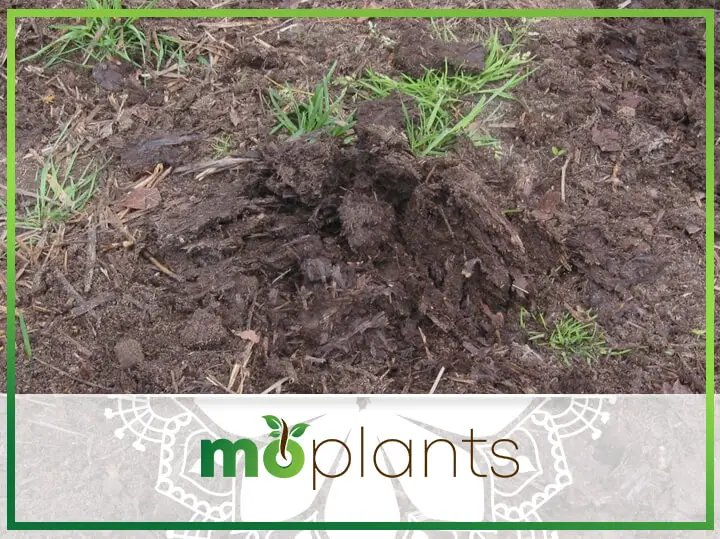When it comes to garden maintenance, you have to make sure your soil remains healthy and in tip-top shape.
Believe it or not, fresh manure is the perfect fertilizer option for your home.
The organic waste product supplies the soil with essential nutrients for plant and vegetable growth.
Expect to get dirty and smell stinky for a bit, but trust us when we say that going through the composting process will yield positive results for the garden.
What Is Horse Manure?
You may feel grossed out, but horse manure is a more scientific version of horse poop.
However, if you think we are convincing you to fill up your garden with animal feces, manure is more than just that. Keep reading to understand the different components of the organic matter.
In addition to feces, manure also contains bedding materials such as sawdust wood chips, hay, and straw. These layers of brown material are gathered in stables so that they can absorb horse urine.
Fresh horse manure is usually alkaline in nature, so the manure pile needs to undergo composting to reach a neutral state.
Therefore, organic matter like seeds, grasses, and undigested plants surround the manure to undergo sterilization during the composting process.
Nowadays, most people use horse manure for their garden beds to generate heat and compost.
Indeed, if you are a new gardener, you can’t go wrong with horse manure composting.
How and Where Can You Get Horse Manure?
You may be thinking, “Do I need to own horses to produce piles of horse manure for my garden?” Although it helps, you don’t have to own one.
All you have to do is go to a nearby stable, barn, or farm and ask the owners if you can have some of their manures.
You can either pay via cash or use the old school barter trade, meaning horse owners give you huge tons of manure in exchange for vegetables.
What Are the Advantages of Using Horse Manure?
If you are scared to use fertilizer products because of the chemical components, you cannot go wrong with horse manure.
Horses eat everything on the grass like haystacks, weed seeds, grains, and even herbicides. Thus, horse manure is safer than chicken manure, cow manure, and sheep manure.
Other manures and fertilizer components tend to burn plants due to their high heat and nitrogen-rich components.
Although compost horse manure still contains nitrogen, it is not as toxic as the rest because it is mixed with undigested plant material.
So even if your garden gains a nitrogen boost, it will not be in excess, thus making horse compost manure safe to use.
All the organic ingredients provide the soil all the nutrients it needs for plants to grow and thrive in your garden.
It is also cheap because of its high supply. If you’re lucky, some owners may even give away horse manure for free.
Lastly, it does not have a strong, pungent odor than other manure types and compost piles in terms of smell.
What Are the Disadvantages of Using Horse Manure?
While horse manure has a handful of benefits, it is not spared from some drawbacks.
Fresh manure has high amounts of nitrogen content and urine. The nitrogen-rich pile may benefit some plant species and flowers, but it can also be harmful to others.
As mentioned earlier, raw manure is alkaline, so berries and plants that are acidic in nature will not enjoy the fresh pile.
Also, horses have a difficult time digesting their food. Therefore, horse manure may contain undigested materials like weeds and seeds.
Composting manure is the best solution to these problems, but it does not help that horse manure takes the longest to compost compared to other animals.
How to Produce a Horse Manure Compost Pile?
Starting a new compost pile requires a lot of hard work and persistence.
It may be a hassle because you’ll have to handle a large pile, but trust us when we say that it will produce positive long-term effects on the soil, plants, and leaves around your garden.
There are a couple of ways for you to compost fresh alkaline horse manure.
Hot Composting Horse Manure
One way is to compost large amounts of manure, which requires tons of horse waste and bedding material.
It should be in the form of a cone or dome shape and should be at least 3 feet tall.
Once you have gathered all the manure, wet it using a hose to keep it moist. However, make sure not to soak the pile too much to maintain its natural shape and texture.
If you want to check the heat index, use a compost thermometer for accurate results.
For the seeds to start sterilizing, your compost needs to have a temperature of around 130 degrees for more protection against pathogens. [R]
Once it reaches that temperature after three days, remove the outermost parts of the pile so that you put the new one over the old one.
The hotbed parts located at the pile’s center should be on top of the cooler so that the remaining uncomposted manure material receives heat.
The end-goal is for your horse manure to have a loamy appearance. It should also smell like soil and wood shavings instead of poop.
Vermicomposting Manure
Did you know that worms are huge fans of horse manure? Therefore, involving them in the compositing process is another great way to keep the soil healthy. [R]
However, to get results, you want to start with aged manure rather than fresh manure. The former is usually more watered-down compared to hot composted manure.
Watering aged manure daily keeps the pile moist, rinses out residue for deworming medication, and limits ammonia buildup.
The half-composted manure serves as a garden bed for worms. They won’t need worm food for a couple of weeks because there are many nutrients in bedding.
When worms eat horse manure compost, they also create vermicompost, which becomes another organic fertilizer for your garden.
How Can You Use Horse Manure?
You can use horse manure in a plethora of ways.
Whether you want to use it as a less toxic fertilizer, an organic soil amendment, or even an alternative to soil itself, the choice is yours.
We highly recommend that you take advantage of all the manure that is at your disposal. The last thing you want is to leave it untouched and lying around in the stable.
Fertilizer for the Soil and Plants
Before you begin the planting process, surround the garden area with horse manure compost. It packs nutrients and other additives that enrich the soil.
If you already have plants around your garden, you can still use horse manure as fertilizer. It eliminates harmful weeds and promotes more effective plant growth.
It can even benefit some flower species. Roses enjoy the alkaline level of fresh manure.
Once you apply it to the flower’s roots, you will have difficulty telling the differences between the soil and horse manure.

Raised Beds
Do you want to use raised beds for a more experimental approach? It is perfect for housing composted manure because it safeguards plants from the risk of pest infestations.
All you have to do is supply the raised bed with brown materials.
You may have to wait a while for these components to complete composting, but after a year, expect to use your beds for planting purposes.

Pots
Pots are great places for storing horse manure. The steps in applying the organic fertilizer are similar to that of the raised bed.
Fill the pot with horse manure and an extra layer of soil. These will benefit your plants because of the high levels of nutrients both components possess.
If you are a fan of vermicomposting, go for pots with holes at the base so that the worms will have an easier time penetrating both the manure and soil.
They will speed up the composting process, thus allowing you to plant sooner rather than later.

Infographic

Conclusion
As they say, one man’s trash is another one’s treasure. The same can be applied to manure.
At the surface level, it can be deemed as too much waste for the stable. However, this article proves that horse poop is considered a gold mine for your plants and veggies all around the garden area.
We hope that you and your fellow gardeners were enlightened about what it can do for your plants and soil. Enjoy assembling the pile, and happy digging!
For more questions and inquiries, please feel free to contact us.

